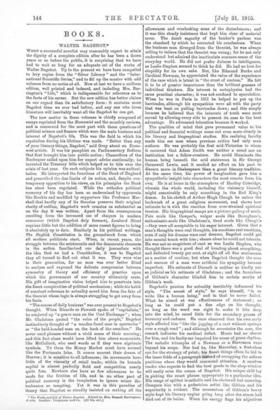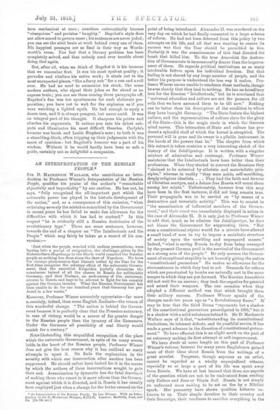BOOKS.
WALTER BAGEHOT.• WHEN a successful novelist may reasonably expect to attain the dignity of a complete edition after he has been a dozen years or so before the public, it is surprising that we have had to wait so long for an adequate set of the works of Walter Bagehot. Up to the present we have been compelled to levy copies from the "Silver Library" and the "Inter- national Scientific Series," and to fill up the muster with odd volumes from no series at all. Now at last we have a uniform edition, well printed and indexed, and including Mrs. Bar- rington's "Life," which is indispensable for reference as to the facts of his career. But the new edition has better claims on our regard than its satisfactory form: it contains more Bagehot than we ever had before, and any one who loves literature will inevitably want all the Bagehot he can get.
The new matter in these volumes is chiefly composed of essays reprinted from the Economist and the monthly reviews, and is concerned for the most part with those questions of political science and finance which were the main business and interest of Bagehot's life, This was the field in which his reputation during his lifetime was made. "Better than any of your literary things, Bagehot," said Greg about an Econo- mist article. It was his pamphlet on Parliamentary Reform that first brought him into public notice ; Chancellors of the Exchequer called upon him for expert advice continually; he invented the Treasury bills which helped us to tide over the crisis of last year. On such subjects his opinion was authori- tative. He interpreted the functions of the Bank of England and prescribed the due limits of its action, and, despite con- temporary opposition to his views, on his principles the Bank has since been regulated. While the orthodox political economy of his day has been so undermined by opponents like Ruskin and modified by supporters like Professor Mar- shall that hardly any of its theories preserve their original clarity of outline, Bagehot's work remains as substantial as on the day it was written. Apart from the consequences resulting from the increased use of cheques in modern commerce (which Bagehot duly foresaw), Lombard Street requires little but the addition of more recent figures to bring it absolutely up to date. Similarly in his political writings, The English Constitution is the groundwork from which all modern publicists start. When, in recent years, the struggle between the aristocratic and the democratic elements in the nation familiarized our daily journalists with the idea that we had a Constitution, it was to Bagehot they all turned to find out what it was. They were wise in their generation, for no man was ever better fitted to analyse and expound the delicate compromise between symmetry of theory and efficiency of practice upon which the government of our country ultimately rests. His gift of imaginative vision helped him to penetrate into the finest complexities of political mechanism ; while his habit of constant reference to actuality saved him from the fate of the theorist whose logic is always struggling to get away from his facts.
" The course of daily business" was ever present to Bagehot's thought. When Ricardo or Fawcett spoke of "capitalists," he conjured up "a grave man on the Coal Exchange" ; when Mr. Gladstone quoted " the voice of the people," Bagehot instinctively thought of " a wooden-faced man in spectacles " or "the bald-headed man on the back of the omnibus." He never used phrases without a vivid sense of their meaning ; and this fact alone would have lifted him above economists, like McCulloch, who used words as if they were algebraic symbols. To them the Money Market must have seemed like the Fortunate Isles. It comes nearest their dream of Heaven ; it is sensitive to all influences ; its movements have little of the viscosity of retail trade; within its bounds capital is almost perfectly fluid and competition nearly quite free. Nowhere else have so few allowances to be made for the friction of life, and in no other part of political economy is the temptation to ignore minor dis- turbances so tempting. Yet it was in this paradise of theory that Bagehot so steadily insisted on making all the
Tho Works and, Life of Walter Buqehot. Edited by Kra. Elwell Barrington. -0 vole. London : Lonionana and Co. [Z3 15e. not..1
allowances and overlooking none of the disturbances ; and it was this steady insistence that kept him clear of material error. The dumb sagacity of the banker's parlour was the standard by which he corrected his conclusions. When the business man diverged from the theorist, he was always willing to believe that the theorist was wrong; for be not only understood but admired the inarticulate common-sense of the everyday world. He did. not prefer dulness to intelligence, as Leslie Stephen seemed to think he did. He had no love for stupidity for its own sake. But, like Edmund Burke and Cardinal Newman, he appreciated the value of the experience of the race which is latent in "the crust of custom." He felt it to be of greater importance than the brilliant guesses of individual thinkers. His interest in metaphysics had the same practical character; it was not confined to speculation. When he was in Paris in Nil be helped to put up the barricades, although his sympathies were all with the party that was bent on pulling barricades down; and this simply because he believed that the interests of truth were most served by allowing every side to present its case to the best advantage. He advocated toleration because it worked.
The qualities of mind that gave permanent value to his political and financial writings come out even more clearly in his literary and biographical studies. His realizing faculty made him see men where previous critics had only seen authors. He was probably the first mid-Victorian to whom it occurred that Adam Smith was neither a creed nor an institution but a fellow-creature. He could illuminate the human being beneath the arid statesman in Sir George Cornwall Lewis, and it needed no effort on his part to discern more in Shakespeare than a great literary tradition. At the same time, his power of imagination gave him a sympathetic insight into characters the most remote from his own. He is at home in the atmosphere of Hartley Coleridge, wherein the whole world, including the visionary himself, might conceivably be only something in the Red King's dream. In his sketch of Arthur Hugh Clough he enters the backwash of a great religious movement, and shows how intimate he is with the reaction from over-strained spiritual tension. His biographical essays are a picture gallery of souls. Pale souls like Cowper's, vulgar souls like Brougham's, enthusiastic souls like Gladstone's, tired souls like Clough's —they were all acceptable to his eager interest. Given that a man's thoughts were real thoughts, his emotions real emotions, even if only his dreams were real dreams, Bagehot could get into mental touch with him ; shams alone he could not tolerate. He was not so suspicions of cant as was Leslie Stephen, who thought there was a good deal of humbug about everything, and deducted twenty per cent. at eight off all fine sentiments as a matter of routine; but when Bagehot thought the core and essence of a man were artificial his sympathy became imperfect. His estimate of Disraeli is neither so kindly nor so judicial as his estimate of Gladstone ; and the formalism of Gibbon's character blinded him to certain merits of Gibbon's work.
Bagehot's passion for actuality inevitably influenced his style. " The secret of style," he says himself, " is to write like a human being," and in that ho never failed. What he aimed at was effectiveness of statement ; so long as he could put a fine edge on his thought, so long as the word was right to make it bite deep into the mind, he cared little for the secondary graces of harmony and cadence. He once observed that his own early style affected him "like the jogging of a cart without springs over a rough road " ; and although he overstates the case, the remark indicates his cardinal defect. Music bad no charm for him, and his faulty ear impaired his sense of prose rhythm. The melodic triumphs of a Newman or a Stevenson were beyond his scope. Nor had he, like Macaulay, a first-class eye for the strategy of print; his finest things often lie hid in the inner folds of a paragraph instead of occupying the salient positions where they would command attention. A careless reader who expects to find the best goods in the shop-window will easily miss the cream of Bagehot. His unique skill lay in picking the exact phrase appropriate to a particular idea. His range of epithet is catholic and his choice all but unerring. Compare him with a pedestrian artist like Gibbon and his superiority is evident. The momentum of Gibbon's heavy style kept his literary engine going long after the steam bad died out of its boiler. When his energy flags his adjectives
turn mechanical at once ; courtiers automatically become "obsequious" and prelates " haughty." Bageliot's style does not allow sound to govern sense ; his sentences are never jaded ; you can see the alert brain at work behind every one of them. His happiest passages are as final in their way as Words- worth's verse. You feel that a literary problem has been completely solved, and that nobody need ever trouble about doing that again.
But, after all, when we think of Bagehot it is his humour that we remember first. It was his most opulent quality ; it pervades and vitalizes his entire work; it steals out in the most unexpected places, "like a furry cub" for a run and a roll over. He had no need to economize his stock, like some modern authors, who signal their jokes as far ahead as an express train ; you can see them coming three paragraphs off. Bagehot's fun was too spontaneous for such elaborate pre- paration; you have not to wait for the explosion as if you were watching a lighted squib. He bad enough to equip a dozen men, and it is always pungent, but never acrid. It was an integral part of his thought. It sharpens his points and clinches his arguments. It entices you into his driest sub- jects and illuminates his most difficult theories. Carlyle's humour was harsh and Leslie Stephen's sour ; to both it was a stumbling-block, often tripping up their judgments with the snare of cynicism: but Bagebot's humour was a part of his wisdom. Without it be would hardly have been so safe a guide, certainly not so delightful a companion.



































 Previous page
Previous page